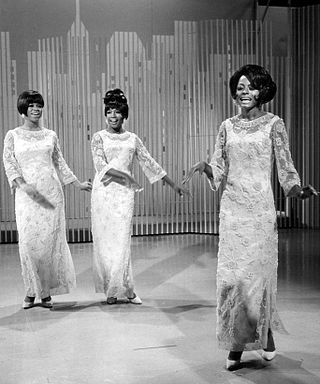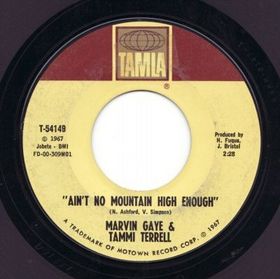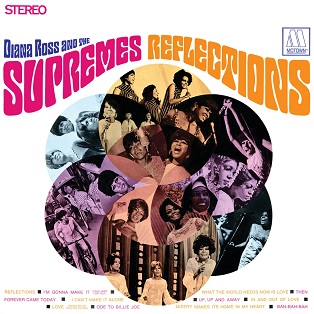
The Supremes was an American girl group and a premier act of Motown Records during the 1960s. Founded as the Primettes in Detroit, Michigan, in 1959, the Supremes were the most commercially successful of Motown's acts and the most successful American vocal band, with 12 number-one singles on the Billboard Hot 100. Most of these hits were written and produced by Motown's main songwriting and production team, Holland–Dozier–Holland. It is said that their breakthrough made it possible for future African-American R&B and soul musicians to find mainstream success. Billboard ranked the Supremes as the 16th greatest Hot 100 artist of all time.

Diana Ross is an American singer and actress. She rose to fame as the lead singer of the vocal group The Supremes, who became Motown's most successful act during the 1960s and one of the world's best-selling girl groups of all time. They remain the best-charting female group in history, with a total of twelve number-one hit singles on the US Billboard Hot 100, including "Where Did Our Love Go", "Baby Love", "Come See About Me", and "Love Child".

Florence Glenda Chapman was an American singer and a founding member of the Motown vocal female group the Supremes. She sang on 16 top 40 singles with the group, including ten number-one hits. After being removed from the Supremes in 1967, Ballard tried an unsuccessful solo career with ABC Records before she was dropped from the label at the end of the decade.

Mary Wilson was an American singer. She gained worldwide recognition as a founding member of The Supremes, the most successful Motown act of the 1960s and the best-charting female group in U.S. chart history, as well as one of the best-selling girl groups of all-time. The trio reached number one on Billboard's Hot 100 with 12 of their singles, ten of which feature Wilson on backing vocals.

"Stop! In the Name of Love" is a 1965 song recorded by the Supremes for the Motown label.

"Reflections" is a 1967 song recorded by The Supremes for the Motown label. It was the first Supremes record released under the new billing, Diana Ross & the Supremes, and is among their last hit singles to be written and produced by Motown's main production team Holland–Dozier–Holland (H–D–H).

"Baby Love" is a song by American music group the Supremes from their second studio album, Where Did Our Love Go. It was written and produced by Motown's main production team Holland–Dozier–Holland and was released on September 17, 1964.

"Come See About Me" is a 1964 song recorded by the Supremes for the Motown label. The track opens with a fade-in, marking one of the first times the technique had been used on a studio recording.

"Love Child" is a 1968 song released by the Motown label for Diana Ross & the Supremes. The second single and title track from their album Love Child, it became the Supremes' 11th number-one single in the United States, where it sold 500,000 in its first week and 2 million copies by year's end.

"I Hear a Symphony" is a 1965 song recorded by the Supremes for the Motown label.

"Ain't No Mountain High Enough" is a song written by Nickolas Ashford & Valerie Simpson in 1966 for the Tamla label, a division of Motown. The composition was first successful as a 1967 hit single recorded by Marvin Gaye and Tammi Terrell, and became a hit again in 1970 when recorded by former Supremes frontwoman Diana Ross. The song became Ross's first solo number-one hit on the Billboard Hot 100 chart and was nominated for the Grammy Award for Best Female Pop Vocal Performance.

Reflections is the twelfth studio album recorded for Motown by Diana Ross & the Supremes. Released in 1968, it was the first regular studio LP to display the new billing of the group formerly known as "The Supremes." It contains the singles "Reflections", "In and Out of Love" and "Forever Came Today". Also included are covers of songs made famous by Martha and the Vandellas and The 5th Dimension. Also present are songs written by other famous names, including "Bah-Bah-Bah" co-written by Motown singer Brenda Holloway with her younger sister, Patrice, an original Smokey Robinson composition titled "Then", and "What the World Needs Now Is Love" by Burt Bacharach and Hal David, which Motown planned to release as a single in the spring of 1968, but cancelled. It also contains a cover of Bobbie Gentry's "Ode to Billie Joe," whose original recording kept the single #2 "Reflections" from peaking at the top spot on the Billboard Hot 100 in September 1967, and it hit #2 on Cashbox.

The Supreme Florence Ballard is a 2001 release by Universal Music Group's Spectrum Music. The release compiles the 1968 ABC Records solo recordings of Florence Ballard with four Motown tracks she recorded lead vocals for whilst in The Supremes. The ABC Records album, originally titled You Don't Have To, was shelved and bootlegged heavily preceding the compilation's release. Ballard's second ABC single, "Love Ain't Love", was covered by Udell Anderson in 1969 and by Madeline Bell in 1971.

"Love Is Here and Now You're Gone" is a 1967 song recorded by the Supremes for the Motown label.

A Bit of Liverpool, released as With Love (From Us to You) in the UK, is the third studio album by the Supremes, released in the fall of 1964 on the Motown label. It was produced by Berry Gordy with Hal Davis and Marc Gordon doing the mixing.

Diana Ross & the Supremes: Greatest Hits is a two-LP collection of singles and b-sides recorded by The Supremes, released by Motown in August 1967. The collection was the first LP to credit the group under the new billing Diana Ross & the Supremes. Although founding member Florence Ballard is pictured on all album artwork and sings on all the tracks, by the time the set was released, she had been fired from the group and replaced by Cindy Birdsong.

Mary Wilson is the debut solo album by the founding Supremes member, Mary Wilson, released on the Motown label in 1979.
"A Breathtaking Guy" is a 1963 song written and produced by Smokey Robinson and released first by Motown singing group The Supremes (1963) and later by The Marvelettes (1972). The single was originally released under the title "A Breath Taking, First Sight Soul Shaking, One Night Love Making, Next Day Heartbreaking Guy" by The Supremes, but was shortened after its official release. All three Supremes members - Diana Ross, Florence Ballard and Mary Wilson - sang the chorus with the original title together.

"In and Out of Love" is a 1967 song recorded by The Supremes for the Motown label. It was the second single issued with the group's new billing of Diana Ross & the Supremes, the penultimate Supremes single written and produced by Motown production team Holland–Dozier–Holland, and the last single to feature the vocals of original member Florence Ballard.

"Where Did Our Love Go" is a 1964 song recorded by American music group the Supremes for the Motown label.



















